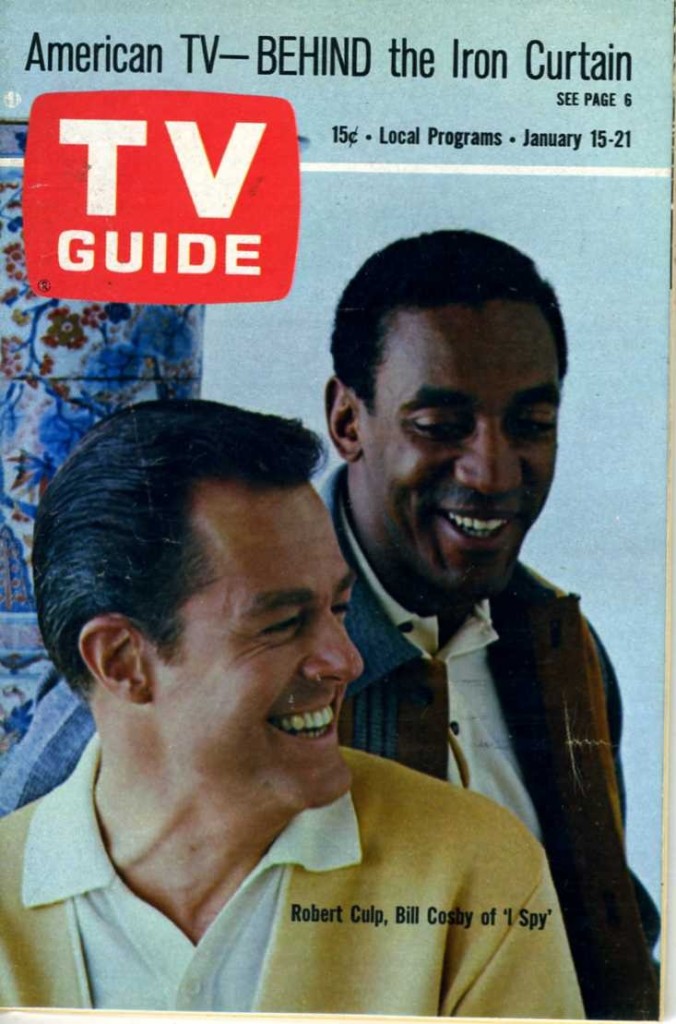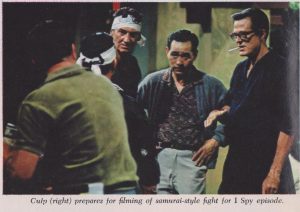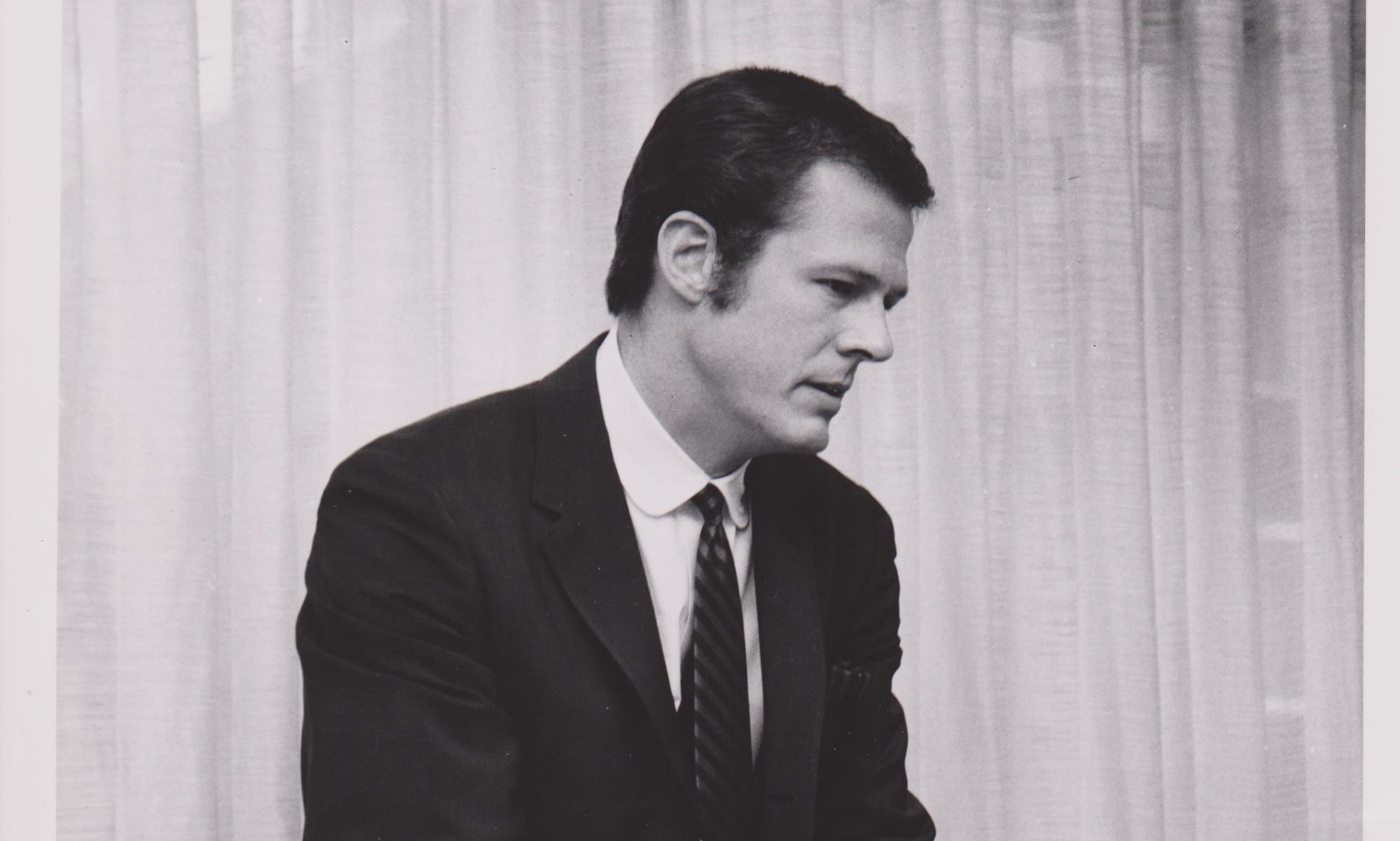From TV Guide, January 15, 1966

Robert Culp’s character is revealed by his behavior on ‘I Spy’ and off.
BY DICK HOBSON
“Some of these white cats they say, ‘Hey, man, dig this, dig that, dig the other thing.’ When they talk like that they think they’re saying: ‘See? I’m with you. I’m sympathetic to the Negro cause.’ But I just say, ‘Man, you talk that way at home?’ I’d rather have a cat that shuts up and does it than a cat with the words. That’s what I like about Bob Culp. He’s a cat that does it. I got confidence in the man.”
The speaker is Negro comedian Godfrey Cambridge, all got up in white flannels and navy-blue double –breasted yachting jacket, as he paces the deck of a luxurious yacht on Stage 6 at Desilu-Cahuenga Studio in Hollywood. He awaits the nod of Robert Culp, who is directing his first I Spy episode, “Court of the Lion.”
“A Negro’s always got to be the Good Guy on TV these times,” Cambridge says. “I am tired of being loved. Now this king of the Zulus is the first villain I’ve been allowed to play on TV. I’m doing a black Goldfinger. Bob Culp had the guts to put me in this part. So many other people in this town would say, ‘Let’s not have an argument, let’s make the Zulu an Indian.’ But Culp says, ‘Let’s do it right.’ That’s what I like about Culp.”
Sagebrush Victorian would describe the style of Robert Culp’s dressing room: leather upholstery, bar with a foot rail, roll-top desk—a hark back to his days as Texas Ranger Hoby Gilman on Trackdown. Prominently hung in an oval gilt frame is a photo of Sammy Davis Jr. gripping Culp in a vigorous bear hug. The door is flung open and the minor whirlwind that is Bob Culp whips across the room, deflating into a chair, sandals flying. “First question,” he says, in the manger of a director saying, “Action.” The man is lean, athletic, brown of hair, hazel of eye, and looks rather professorial behind his horn-rim glasses.
 It’s true, he had to shell out $2000 to get into the Directors Guild in order to direct this episode, for which his director’s pay is $3500. He concedes he laid out $2500 for an artist to story-board the entire script. “Rarely can a man successfully act and direct at the same time. One has to suffer and it will always be the acting.” That conviction is what motivated Culp to hire acting coach Jeff Corey to stand by and observe his performance.
It’s true, he had to shell out $2000 to get into the Directors Guild in order to direct this episode, for which his director’s pay is $3500. He concedes he laid out $2500 for an artist to story-board the entire script. “Rarely can a man successfully act and direct at the same time. One has to suffer and it will always be the acting.” That conviction is what motivated Culp to hire acting coach Jeff Corey to stand by and observe his performance.
“At first I found only nitwits in this business,” Culp is saying. “I became childishly hostile. I got the image ‘troublesome.’ But I got wiser. I set about to rectify my ways.”
One of those to whom he was “childishly hostile” was Vincent Fennelly, producer of Trackdown, the series Culp starred in back in 1957. Fennelly claimed Culp walked more like a Method actor than a Texas Ranger, and for a year they didn’t speak to each other. “Yeah, he thought I walked funny,” Culp says, “I invented my own kind of slouch-stroll. Fennelly’s an accountant. He wanted the same old Western hero. But he was right; I was wrong. In Omaha they couldn’t care a rat’s nose.”
*****
A thick blue pall clouds the dressing of Bill Cosby, first Negro to co-star in a network dramatic series. Cosby is stretched over an easy chair, puffing on a 9-inch cigar, sprawled under a framed photo of the co-stars dressed in tennis garb.
“I could be just a nothing. I could be crumpled and crushed if Bobby had turned out to be the kind of guy who wants everything for himself,” Cosby says. “But we made contact. We tuned each other in. Now Bobby knows me better than anybody. We’re closer than brothers.” Godfrey Cambridge sidles into the room and pours himself some coffee, picking up the drift of the conversation. Cosby continues: “We don’t have any race jokes in the scripts. Even in real life, race jokes would be embarrassing to Bobby and embarrassing to me.”
But what about Sammy Davis Jr. and the Clan? They’re integrated and they make ethnic-type jokes. “The old-timers like Sinatra do it. But the Clan has guilts and complexes. They’ve always got to talk about race. It’s very corny, unhip. We’re beyond that.
“You know how the Clan has to have a Leader and all that? No King of the Road with us. Bobby and I are equal. Another thing, we’re closer to the people. The Clan could play golf on Forest Lawn, they’ve got so much money.”
*****
Out in Woodland Hills in San Fernando Valley waits Culp’s wife, the former Nancy Wilner (or former Nancy Asch, actress-theatrically speaking), described by a close friend as “nutty, droll, and bright.” “I hate being called a ‘former’ somebody. Just say I’m the current Mrs. Culp. There was a previous Mrs. Culp, you know—Bob’s college drama coach. She was 24; he was 19. I think she was another mother to him. Shall we tour the homestead?” It’s a big, old frame house with an oversize cupola, a decidedly eccentric house among all those new-moderns in suburbia.
“This is the playroom. This is Jason’s room. This is Joshua’s room. This is Joseph’s room. This is Rachel’s room.” All but one of the offspring are pre-schoolers. One room has a jungle tree-house in one corner and bunks suspended from the ceiling on chains. “Bob did it.” Another is fitted like a ship’s cabin with bunks, ladder, and real portholes. “Bob built it. This is our kitchen. Bob laid the floor.
“We first met at an off-Broadway theater. Off-stage he was very shy, insecure, ill-at-ease. But on-stage he could do the most fantastic things. We did the Greenwhich Village scene together, the Brando thing, the motorcycles, the whole bit.”
On a peg hangs a black cowboy hat. “Gary Cooper’s. Bob wore it in a Gunsmoke.” The oversize cupola on the third floor turns out to be Culp’s study. “We call it the Lion’s Den.” Up here Culp has a 360-degree view of his two-acre wooded domain. Here is his typewriter.
“Bob’s first script was a Trackdown. He thought all the stories were adolescent drivel. So he just wanted to do one that would be his own way. But Trackdown was an unhappy period for us. It was agony for Bob to go to the studio each day. He was hanging on for dear life. I didn’t know from one day to the next whether he would come home or not. Sometimes he didn’t.”
*****
After Trackdown, Culp loudly let it be known he wanted no more of series. “Bob had a reputation as being quite tumultuous,” agent Jimmy McHugh says of him. “He’s one of those actors who has a deeply rooted desire to say something in his work. But Hollywood is not that kind of town.” Culp says: “Jimmy helped me change. He set out to make a comedy image for me and he did a beautiful job.” In two years Culp made four feature pictures, including “Sunday in New York.”
Any discussion of I Spy invariably returns to the Culp-Cosby relationship. Mark Rydell, who has directed three I Spy episodes this season, says: “Bob could easily overpower Cos simply by exercising his talent. But Bob is always helping Cos and guiding him in a way that I find quite moving.”
“Half of my energy is spent trying to translate their private communications,” says Paul Wendkos, director of eight of this year’s I Spys. “Culp and Cosby have put-ons on top of put-ons. They’re ‘hippies,’ to use one of Bob’s favorite words. They always take the off-beat way. But underneath their hip, existentialist veneer is the sense of irony just this side of bitterness- the irony of the artist in show business, the irony of racial inequality.”
“Bob is incensed by prejudice,” says Culp’s friend, director Sam Peckinpah. “He doesn’t recognize it; he doesn’t understand it. Yet he’s not trying to carry any particular banner.” Wendkos adds: “Bob’s attitude is, ‘I don’t have to crusade. I’m it.’”
According to I Spy co-producer Mort Fine: “There is a wide audience acceptance of the camaraderie between Culp and Cosby, the white man and the Negro. People want to do the right thing, white to Negro. I think it’s vicarious. They want to watch it in action.”
“Yeah,” says Godfrey Cambridge sardonically, “watching I Spy on the tube provides a relationship with a Negro with no risk.”
As for Bob Culp, he says only, “If Cos and I have any kind of mission on this show, it’s something we’ve never had to discuss.”


this makes him even more of a hero to me. wanted to be like him in 1966 and i still do today. and i mean Today.
thanks for all you do on this site.
What a wonderful article about a wonderful man. Thank you for all the hours of great entertainment that you gave us through the years.
H